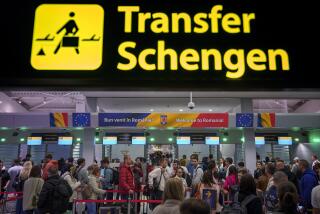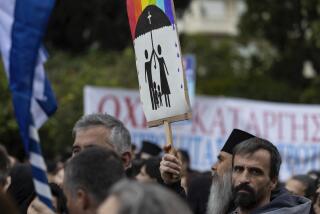Bulgarian Factions Act to Ease Tensions : East Bloc: They agree on compromise to restore equal rights, religious freedom to Turkish minority.
- Share via
SOFIA, Bulgaria — Representatives of Bulgaria’s many political factions Friday agreed on a compromise draft plan aimed at easing potentially volatile ethnic tensions that have threatened to overwhelm the country’s efforts to establish genuine democracy.
A draft declaration, agreed upon after five days of intense and often heated debate, would restore equal rights and religious freedom for the country’s minority Turkish population, yet guarantee national unity and the primacy of the Bulgarian language to a nervous Bulgarian majority.
It marked the first time that leaders from all sides of the highly sensitive issue had formally agreed on a possible solution since the Communist dictator Todor Zhivkov was deposed last Nov. 10.
A series of demonstrations and strikes rocked parts of the country earlier this month after Bulgaria’s new, reform-minded Communist leadership announced a reversal of Zhivkov’s attempt to forcibly assimilate the country’s Turkish minority.
Under Zhivkov, the Turks, estimated to number 1 million to 1.5 million, were forced to take Bulgarian names, forbidden to speak Turkish in public and discouraged from practicing their Muslim religion.
The intention to restore the Turks’ rights was a rare decision backed both by the Communist leadership and the country’s recently formed opposition groups.
Protests against the move were purportedly generated by a minority of Bulgarian arch-nationalists. However, diplomatic observers suspected they were also being orchestrated, at least in part, by hard-line Communists who still cling to power in the country’s outlying regions.
Those attempting to steer Bulgaria to its first free elections since World War II have worried that the ethnic question might derail their efforts.
Stoking Bulgarian fears of the Turks is easily done with reminders of the five centuries that Bulgaria spent as part of the Ottoman Empire.
Vice President Vassily Merachkov of the Bulgarian government’s ruling State Council, who presided over the drafting committee, said the document agreed upon Friday will be presented to the national Parliament for full debate soon after it reconvenes Monday.
“National reconciliation and unity are now the major issues before the national assembly,” Merachkov said in announcing the agreement.
“We want to come out of isolation. We want real democracy. But to succeed, we need unity,” he added. “We’ve had real tension . . . that could paralyze the country and force Bulgaria to take a step backwards.”
The agreement calls for an end to discrimination and guarantees freedom of conscience, basic human rights and religious expression.
It specifically calls for legislation by the end of February that would ensure free choice of family names.
It also states that the Bulgarian language should be protected as the country’s exclusive language for schools and official use, but it would permit other languages in more informal contact.
The draft document was drawn up by a hastily convened 19-member ad hoc committee representing various strains of national opinion.
The new government has been under considerable international pressure to restore the human rights of the Turkish minority. Last year, about 300,000 Turks fled Bulgaria to escape persecution.
It is widely believed that badly needed Western aid to revive the country’s beleaguered economy would be difficult to win until Turkish rights are restored.
News of the agreement was greeted by applause Friday from a group of people waiting at the national Parliament building in Sofia and with a cautious optimism by diplomatic observers who have followed the issue.
Mincho Minchev, spokesman for the Union for Defense of the National Interest, a Bulgarian nationalist group, said he had accepted the document unconditionally and pledged an end to protest strikes.
However, barely two months after the end of prolonged repressionist rule in Bulgaria, diplomatic observers cautioned that it is impossible to assess the loyalty such figures command.
Whether a plan can be accepted, for example, by Bulgarians in the heavily Turkish southeastern regions of the country, remains unclear.
More to Read
Sign up for Essential California
The most important California stories and recommendations in your inbox every morning.
You may occasionally receive promotional content from the Los Angeles Times.












